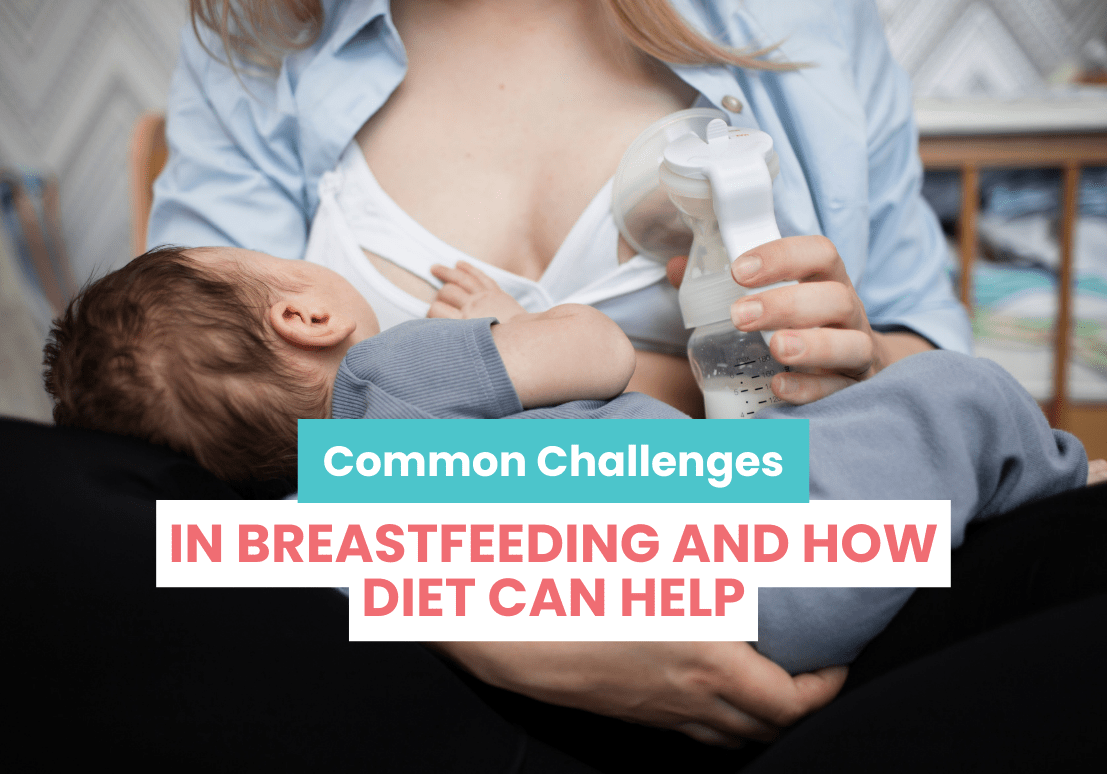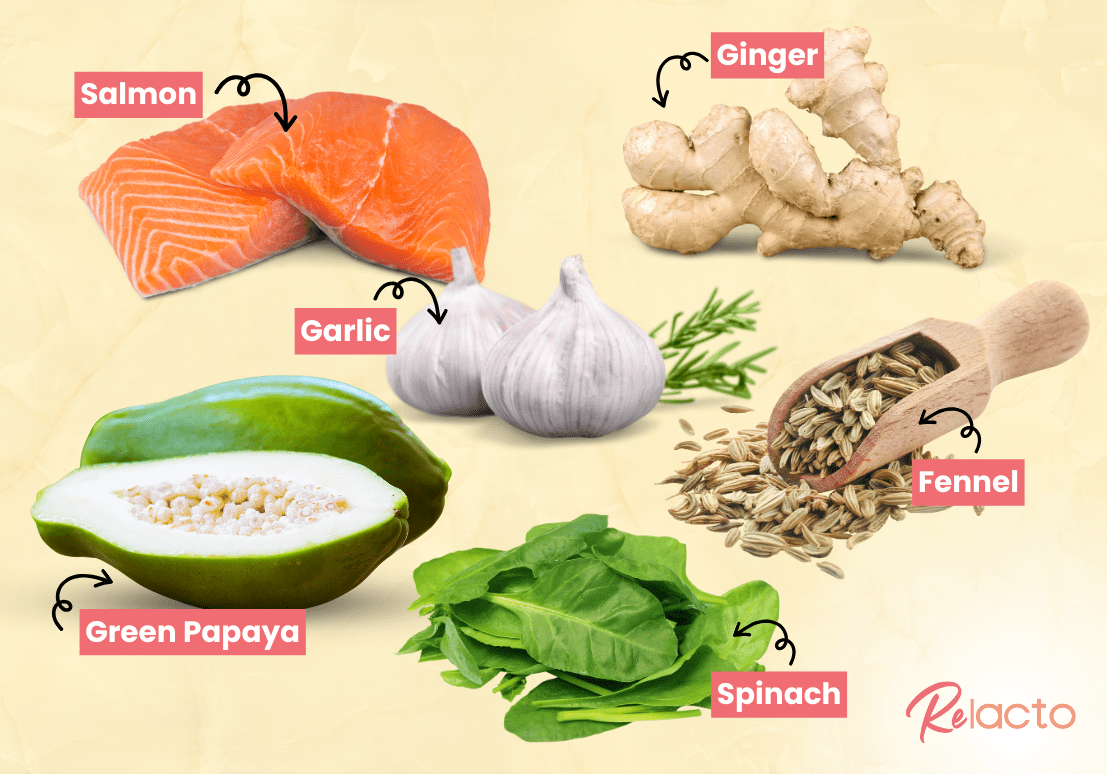Common Challenges in Breastfeeding and How Diet Can Help

Breastfeeding, a beautiful and natural way to nourish your baby, can sometimes feel like a puzzle to solve. Picture your body as an incredible machine designed to produce the perfect food for your baby—breast milk. Like dedicated workers, your breasts tirelessly produce milk to meet your baby’s needs. However, like any machine, there can be occasional hiccups. That’s where understanding common challenges and the help of diet comes in.
We’re here to help, mamas. This blog post will guide you through these challenges and show how diet can be your secret tool for a smoother breastfeeding experience. Let’s make this journey a rewarding and unforgettable experience for you and your precious little one.
Constipation
Yeah, it’s not the most attractive topic, but let’s be honest, it happens. And when you’re already dealing with the joys of lack of sleep and a tiny one attached to your breast, the last thing you need is the added frustration of constipation.
While the frequency of bowel movements can vary, certain signs indicate constipation in breastfeeding mothers:
- Hard, Dry Stools. Difficulty passing stools due to their dry and firm consistency.
- Straining and Pain During Bowel Movements. Constipation often leads to discomfort and straining while passing stools.
- Bloating and Abdominal Pain. The buildup of stool can cause bloating and abdominal discomfort.
- Reduced Appetite. Constipation can sometimes lead to a decreased appetite.
While the discomfort can be discouraging, simple dietary changes can be your BFF in promoting regular bowel movements.
- Increase your Fibre Intake. It adds bulk to your stool, making it easier to pass. Think of it as adding little brooms to your gut, sweeping everything out smoothly. Aim for at least 25-35 grams of fibre daily. Prunes, carrots, broccoli, whole-wheat bread, lentils and more!
- Drink Plenty of Fluids, Especially Water. We all know water is essential, but when you’re breastfeeding, it’s even more important. Dehydration can worsen things, so drink at least 8-10 glasses of water daily. You can also add herbal teas and clear broths for extra hydration points.
Low Milk Supply
“Is my breast milk supply enough?” is a common concern among new mothers—but fret not, mamas! Chances are, if your baby is healthy, gaining weight, and producing regular wet and dirty diapers, you provide more than enough nourishment. However, seeking early guidance is essential if you’re still worried about your milk supply. Remember, you’re not alone in this journey, and a wealth of support is available to help you navigate the world of breastfeeding.
How Does Breast Milk Supply Work?
Once your breast milk has come in, your breasts start to make milk through a continuous cycle of ‘supply and demand’. Each time milk is removed, either by your baby feeding or expressing, your breasts receive a signal to produce more milk. When no milk is removed, your body doesn’t receive the cue to continue producing breast milk. That’s why giving bottles of formula can reduce your milk supply.
Diet and Milk Supply
Rule number one in your breastfeeding diet is to ensure you eat enough healthy foods. Breastfeeding is not the time to restrict calories. Instead, your body needs extra energy to produce milk for your little one. A variety of nutrient-rich foods should form the foundation of your breastfeeding diet. Include plenty of fruits, vegetables, whole grains, lean proteins, and healthy fats to give your body the essential building blocks for milk production.

Here are some of the best food to eat while breastfeeding, which can help enhance your milk supply:
- Ginger. Ginger contains compounds that can relax blood vessels and reduce inflammation, enhancing blood flow and circulation throughout the body. This improved blood supply to the mammary glands can contribute to increased milk production.
- Garlic. It is a lactogenic ingredient that has been traditionally used to promote milk production. It is believed that garlic’s active compounds stimulate the mammary glands, leading to increased milk secretion. Garlic can be consumed in various dishes, added to sauces, or taken as garlic supplements.
- Fennel. Fennel seeds contain compounds that can reduce the inhibitory effects of dopamine, a neurotransmitter that can suppress prolactin secretion. Prolactin, the primary hormone responsible for milk production, increases when dopamine’s inhibitory effect is reduced, leading to enhanced milk production.
- Moringa Oleifera. Moringa Oleifera, also known as the drumstick tree, has gained recognition for its potential lactogenic properties. Moringa leaves contain compounds that can stimulate the production of prolactin, the primary hormone responsible for milk production.
- Green Papaya. It is a popular fruit in many Asian cultures and is believed to have lactogenic properties. Studies have shown that green papaya consumption can lead to an increase in breast milk production. Green papaya can be consumed cooked in dishes or soups or made into smoothies.
Inadequate Nutrition
During breastfeeding, you fulfil your nutritional needs and provide essential nutrients for your growing baby. Without proper nutrition, you might feel like you’re constantly running on empty. Think fatigue, hair loss, sleepless nights—not exactly the recipe for a happy mother or a happy baby. If a balanced diet is not prioritised, you’re looking at a higher risk of nutritional deficiencies, which can lead to other complications in the long term for both mother and baby.
Here’s how to make diet your ally in this breastfeeding challenge:
- Focus on Nutrient-Dense Foods. Focus on incorporating foods rich in specific nutrients that may be used up during breastfeeding, such as below, but are not limited to
-
- Vitamin B12. Poultry, fish, beef and pork
- Calcium. Dairy products, fortified plant-based milk, tofu and calcium-fortified foods.
- Vitamin D. Fatty fish, egg yolks, fortified milk and cheese.
- Make Healthy Swaps.
-
- Choose fruits over sugary snacks. Opt for fresh or dried fruits instead of reaching for cookies, candy, or other sugary treats. Fruits are naturally sweet and provide essential vitamins, minerals, and antioxidants. They are also a good source of fibre, which can help you feel fuller for longer.
- Replace refined carbohydrates with whole grains. This means choosing whole-wheat bread over white bread, brown rice over white rice, and quinoa over pasta. Whole grains are richer in fibre, vitamins, and minerals, essential for your gut health and your baby’s development.
Conclusion
Breastfeeding is a beautiful way to bond with your baby and give them the best possible start in life. However, it’s not always easy, and many mamas experience challenges along the way. By making changes to your diet, you can help prevent and overcome common breastfeeding problems, such as constipation, low milk supply, and inadequate nutrition.
It’s no wonder that these nutritional facts can leave you feeling overwhelmed and confused. Let ReLacto take the guesswork out of breastfeeding nutrition and provide you with the best breastfeeding diet plan you deserve during this special time.
Visit our homepage today and discover breastfeeding food package crafted specially for you!







